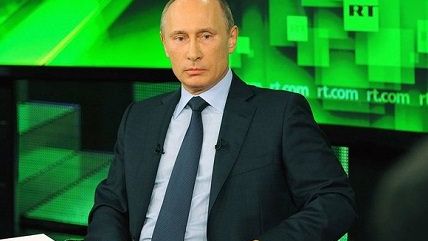Why We Shouldn't Arm Ukraine
The Russians can beat us to any punch, and they would hit harder.

In recent decades, you could make a good living betting on American military intervention in any foreign crisis covered by CNN. President Barack Obama has resisted demands to escalate our response to Russia's aggression against Ukraine, but his resistance may soon collapse.
It has been under great pressure for months, with Republicans accusing him of being "weak and indecisive." This week, a report from three establishment-oriented think tanks—the Atlantic Council, the Brookings Institution and the Chicago Council on Global Affairs—said the United States should provide "lethal defensive arms" and other supplies to the Kiev government. Ashton Carter, nominated to be secretary of defense, said in his confirmation hearing Wednesday, "I'm very much inclined in that direction."
But Obama abstained from shipping weapons to Ukraine because there was no reason to think they would do much good—and there still isn't. Lethal military assistance combines several unappealing features.
It would cost a lot of money that would probably be wasted, since the arms would not be sufficient to stop Vladimir Putin from achieving any military goal he sets. It could induce him to intensify his aggression before our help can arrive.
It could expand the destruction of the fighting without changing the outcome. And it's likely to eventually present the U.S. with a choice between accepting defeat and having to use our own forces to save Ukraine.
No one really doubts that Putin can prevail in this fight. The think-tank report concedes, "Even with enormous support from the West, the Ukrainian army will not be able to defeat a determined attack by the Russian military."
Despite all the martial rhetoric in Washington, we are not going to turn the tide of the war. All the U.S. government can hope to do is raise the price Putin has to pay.
Chicago Council on Global Affairs President Ivo Daalder, who was Obama's ambassador to NATO, told NPR that "the one thing Mr. Putin is most concerned about is Russian casualties." He said, "We know from the history in Afghanistan and other places that when Russian soldiers die, then the cost and the debate in Moscow and in the rest of Russia will go up." The hope is that Russia would retreat or negotiate a settlement.
But the aid might come too late to boost the Russian body count, since Putin would have plenty of time to preempt it. The Russians can beat us to any punch, and they would hit harder.
Justin Logan, a foreign policy analyst at the libertarian Cato Institute in Washington, also notes, "Historically, Russia has been probably the least casualty-averse country on Earth." The Soviets stayed in Afghanistan a decade despite losing more than 14,000 lives—six times more than we have lost there. And Afghanistan was a country that, unlike Ukraine, had no large populace of ethnic Russians pining to rejoin the motherland.
Nor does an increase in casualties necessarily cause outsiders to look for the exit. More often, it spurs them to plunge deeper. That was the case for the Soviets in Afghanistan, as well as the U.S. in Iraq. Turning Ukraine into a struggle against American imperialism would make it easier, not harder, for Putin to justify the sacrifice.
The belief that we can force him to sue for peace is one of those fetching delusions that often overcome our policymakers and pundits. Political scientist Lionel Beehner noted recently in The Washington Post, "Scholarship generally finds that third-party intervention on the side of rebel forces makes conflicts longer, bloodier, and more difficult to resolve through peaceful means."
There is no reason to think intervening on behalf of the Ukrainian government would yield a different result. Often, all you get from expanding a war is an expanded war. In this one, we might ensure more dead Russians—but also a lot more dead Ukrainians.
The problem is that the U.S. has neither the means nor the motivation to stop Putin. Ukraine is always going to be a lot closer to Moscow than to Washington, and its fate is always going to matter a lot more to the Russians than to us.
When the Soviets invaded Hungary in 1956, President Dwight Eisenhower, who was not weak or indecisive, refused to send U.S. troops or weapons to help the pro-democracy Budapest government. "Eisenhower knew that there were limits to his power," wrote biographer Stephen Ambrose, "and Hungary was outside those limits." So is Ukraine.


Show Comments (112)